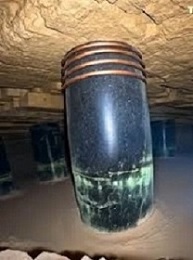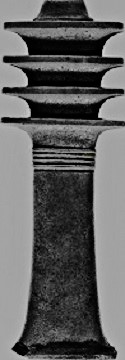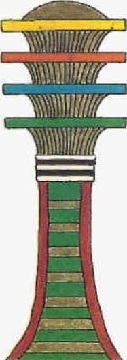|
|
Secret Places | ||||
Exploring the Lost Worlds of the Ancients,
Revealing the Hidden - Uncovering Mysteries of the Past - Retrieving Prehistory
Gallery
of Ancients:



Space Henges
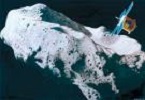
Star Ships?

Mars Pyramids

Mars Structures
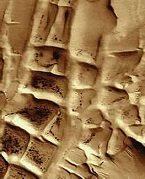
Mars Faces

Mars Mines
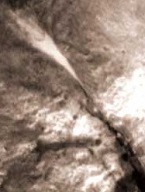
BigFoot

Mars Aquaducts
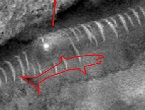
Moon Objects 1

Moon Objects 2
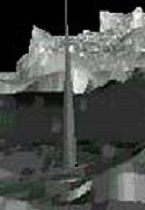
Man-Made Stones

Baltic Anomaly

Sea Pavilions

World Triangles

Japan UnderSea
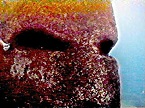
UFO Sightings

Alien Guys

Mars Lakes?

Mars Shrubs?

Star Flight

Ancient Giants

Gigantic Trees
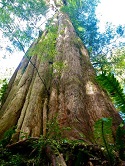
Hyperborea
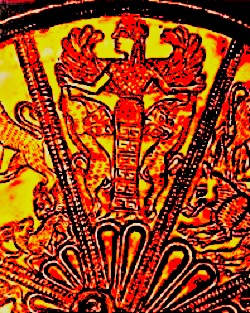
Prehistory Gaels
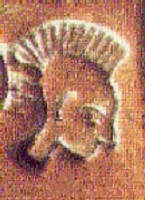
Ancient Skraelings

To Ancient Fire

Index Continuing edits and/or updates: 1/23/26
A Newer Look at Ancient Things
City sized electro-magnetic mega crystal found under the Bermuda Truangle.
Giza Plateau Pyramids Were Under Tsunami Flooded Seas 12,900 Years Ago.
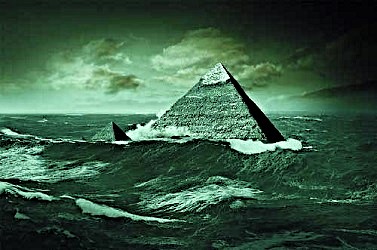
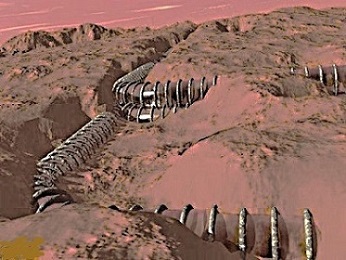
Were Pyramids (((Radio Towers))) to Space, Lightning Electric Collectors, Noble's Tombs?
The video of pyramid Undergtound below shows what appears to be an actual Djed as
portrayed in ancient Egyptian sciences and presented to the uninitiated as a religious icon. The images were analyzed with AI and used in the AI video.
A beige labrador dog is laying lazily in the sand watching the camera crew. The actual djeds were wound around their wide, thick ceramic posts with
copper, sometimes gold or silver electrical connectors. The one shown on left below, has hairlike cracks around its outside circumference wherein copper
oxide is shown having seaped through, leaving thin films of pale aqua-green mineral deposits behind.
Most all of the pillars in the actual sandy room show these hair-like cracks or piecings with pale mineral leakages, as well as having water sinkage-rings
around the bottoms of the tubes. These tubes may have transported newly ionized, mineralized water with Malachite which is a copper carbonate used in water
in fish hatchery ponds and aquariums to purify the water and cleanse the fish eggs, containers and ponds from fungeses and pathogens, and still used today.
This is similar to Hindu Lingams, in which authentic lingams had small gold, silver, and copper rotating plates inside which electrified and ionized the
water run-off poured over them.
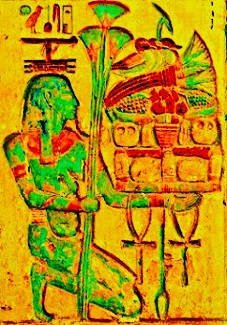 This ionized, or alleged 'Holy' water was used for healing; and still is in the United States in some hospital-sanitariums and in alternative healing
practices. Not only were the artesian springs used for possible hydraulic (placer-type) mining, but might have been used to maintain 'sacred' fish ponds
as well. Possibly the sumps atop the plateau or the Osireion were used for fish hatcheries and not necessarily for the reported fourteen sun boats which
seem to have all disappeared?
This ionized, or alleged 'Holy' water was used for healing; and still is in the United States in some hospital-sanitariums and in alternative healing
practices. Not only were the artesian springs used for possible hydraulic (placer-type) mining, but might have been used to maintain 'sacred' fish ponds
as well. Possibly the sumps atop the plateau or the Osireion were used for fish hatcheries and not necessarily for the reported fourteen sun boats which
seem to have all disappeared?
Image of Osiris with bountiful food supply, above left. Djeds/Dieds below pronounced Diedi/Diedis meaning: Power Source; Governs Life; Tree of Life;
Stability. Used with Ankh: Key of Life; Giver of Life, Water of Life; and was also associated with Pharaoh's names like 'Djoser,' etc. On far right is
Osiris 'Backbone'. It has the same qualities as the djed but represents agriculture, life, death, resurrection, fertility, along with the above.
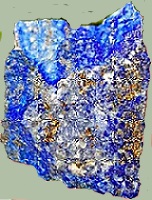
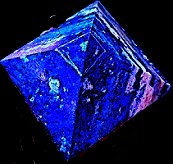 Lapis lazuli is a very dark green, to an almost black ceramic-like stone with gold pyrite streaks and flecks, which was anciently said to have been the
original material of the capstone on top of the great pyramid. Egyptian lapis lazuli was imported from Afghanistan and was very expensive, and highly
prized by the pharaohs.
Lapis lazuli is a very dark green, to an almost black ceramic-like stone with gold pyrite streaks and flecks, which was anciently said to have been the
original material of the capstone on top of the great pyramid. Egyptian lapis lazuli was imported from Afghanistan and was very expensive, and highly
prized by the pharaohs.
Cleopatra wore it as her specialty jewelery. A crystal lapis lazuli is shown on left. A small lapis lazuli stone pyramid is shown on right. The lapis
lazuli may also have been used like a modern ceramic insulator as well as an attractor for the high voltage charges obtained from the electrical fire
strikes from lightning captured.
There are also layers of iron ore embedded across the Giza plateau. Iron ore accompanies gold and quartz in sand, and in its compressed form is granite,
an electricity attracting rock. The gold, iron, and quartz in granite attracts ionized moisture as in rain with lightning. Salt-water (sodium) is an
electrolyte. Archaic people knew well about iron, using and recycling it by resmelting it into newer materials. That is one of the main reasons very
ancient iron, steel (pig-iron) and high technology tools cannot be found. Those who think there was only a recent 'iron-age' need to relearn our lost
archaic and ancient history, most of which has been deliberately removed and replaced with idiotic nonsense.
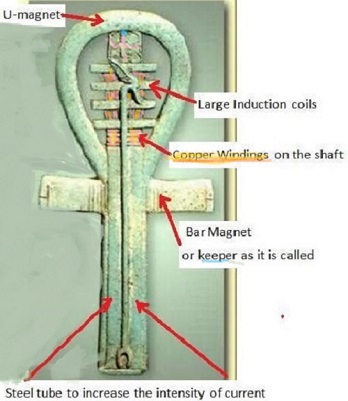 This image is the combined Djed and Ankh and appears everywhere in Egyptian hieroglyphs. In modern terms it is called the 'Tesla-coil.' In science this
image anciently represented the power-source of the universe, its energy, the metaphor of the alleged 'Never ending fountain of life.' This energy is
also represented by a wriggily serpent and is called the Shi, meaning snake, and 'River of life.' You'll notice that these same snakes are the electrical
filaments in the 'Den dera' Temple's long and large light-bulb/tubes.
This image is the combined Djed and Ankh and appears everywhere in Egyptian hieroglyphs. In modern terms it is called the 'Tesla-coil.' In science this
image anciently represented the power-source of the universe, its energy, the metaphor of the alleged 'Never ending fountain of life.' This energy is
also represented by a wriggily serpent and is called the Shi, meaning snake, and 'River of life.' You'll notice that these same snakes are the electrical
filaments in the 'Den dera' Temple's long and large light-bulb/tubes.
The Giza Plateau was once an island surrounded by an ocean, a nature-made unending moat and sea with artesian wells bubbling up from far below, and covered
with valuable mineral and ore deposits. Thus the founding high tech Hyperboreans/Hiberian Celts put it to good use (very simple explanation). Ancient
people also thought they were supposed to be buried on an island within spirit boats that sailed to the sun on the horizon. Some take people's souls
down through the underworld.
Among the other technologies used, the djed/diedi'appears to have been a possible water or mixed liquid transport system (jets), although there are square
block sluice openings through long shafts opening into different areas. The djed/diedi may also have carried oceanic salty electrolytic charged water, with
possible other minerals or chemical salts added. Nothing yet explains the heavy-duty copper rings coiled around the shaft and other parts of the djedis.
 A massive flood hit the Giza Plateau around 10,875 years ago causing the major destruction of the three alleged 4th dynasty pyramids of Giza which had
already been built and standing for at least 900 years prior to that date Leaving fallen and broken stones all over the plateau for the picking;
A massive flood hit the Giza Plateau around 10,875 years ago causing the major destruction of the three alleged 4th dynasty pyramids of Giza which had
already been built and standing for at least 900 years prior to that date Leaving fallen and broken stones all over the plateau for the picking;
"The evidence...suggests one of the largest floods in recorded history occurred relatively soon after the Younger-Dryas impact event of 12,900 KYA covering
the Great Pyramid more than halfway up its side to about 255', leaving telltale ocean residue and signs of ocean incursion of the limestone casings. There
is a second hard salt incrustation line inside the pyramid, and a residue of marine biota on the outside bottom casing stones dated to 12,000 KYA..."See Scientific Evidence with photo proof.
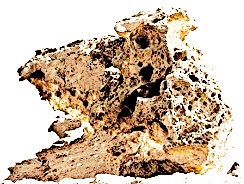 "The GP (Great Pyramid)was a machine that could extract that Electrostatic Field from the ambient atmosphere, functioning to a degree something like a
lightning rod. One of the specific overall relationships of the design is a real time connection as an antenna sink to the ambient electrostatic envelope...
the age of the Giza Plateau could be generally dated based on the alluvial deposits on the plateau.
"The GP (Great Pyramid)was a machine that could extract that Electrostatic Field from the ambient atmosphere, functioning to a degree something like a
lightning rod. One of the specific overall relationships of the design is a real time connection as an antenna sink to the ambient electrostatic envelope...
the age of the Giza Plateau could be generally dated based on the alluvial deposits on the plateau.
"The Great Pyramid of Giza was not constructed by the dynastic Egyptians as evidenced by marine sediments found surrounding the base of the monument, as well
as salt incrustations found within its interior, and salt line watermarks on the stones halfway up its sides. Many seashells and fossils have been found
around the base of the pyramid in some of the silt sediments rising to fourteen feet. Some of those sediments have been radiocarbon-dated to be nearly twelve
thousand years old. Logically, only great quantities of continuous major sea flooding would produce this sediment.
"The dynastic Egyptians were not living in the area until several thousand years after the inundation, so they could never have recorded the event. This evidence
alone suggests that the three main Giza pyramids are probably much older than current speculation suggests. They likely predate the 14,800 catastrophe, and maybe
earlier cataclysms.
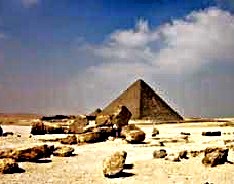 In support of this ancient flood scenario, legends and records tell of watermarks that were clearly visible on the limestone casing stones of the Great Pyramid
before those stones were removed by the Arabs. These watermarks were halfway up the sides of the pyramid, or about 450 feet above present sea level. It is
important to keep in mind that sea levels were 361' lower 13,000 years ago than they are today, making the inundation 254' up the Great Pyramid something around
810' in ocean rise, if the inundation happened about 12,900 years ago.
In support of this ancient flood scenario, legends and records tell of watermarks that were clearly visible on the limestone casing stones of the Great Pyramid
before those stones were removed by the Arabs. These watermarks were halfway up the sides of the pyramid, or about 450 feet above present sea level. It is
important to keep in mind that sea levels were 361' lower 13,000 years ago than they are today, making the inundation 254' up the Great Pyramid something around
810' in ocean rise, if the inundation happened about 12,900 years ago.
"Further, when the Great Pyramid was first opened, incrustations of salt an inch thick were found inside. While some of this salt is known to be natural exudation
from the stones of the pyramid, chemical analysis has shown that some of the salt has a mineral content consistent with salt from the sea. These salt incrustations,
found at a height corresponding to the water level marks left on the exterior, are further evidence that at some time in the distant past the pyramid was submerged
halfway up its height...
"There are 3 different salt lines...That is, the water rose to its highest point about 254' up the side of the Great Pyramid, and remained at that level for some
short period of time, because the salt line residue was relatively thin. Then, following that level stasis, the waters receded to the level of the Queen's Chamber,
and remained there for a long enough period of time, so that the interior salt line grew much thicker. Then the water fell to the lagoon level of 14'-18' as
demonstrated by the sediment around its base." See Scientific
details with photo proof.
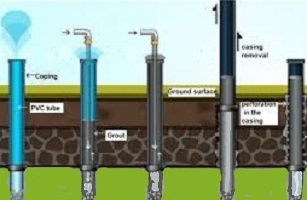 It is obvious the pyramids were built over artesian wells which require very long lengths and wide diameter pipes (stabilized, strong hollow pillars or tubes)
to contain the ever flowing water 'Osiris' which emptied into aquafers--basins and/or reservoirs wherein the water overflow was channeled out into larger catch basins
such as moats, lakes, rivers, and other connecting waterways.
It is obvious the pyramids were built over artesian wells which require very long lengths and wide diameter pipes (stabilized, strong hollow pillars or tubes)
to contain the ever flowing water 'Osiris' which emptied into aquafers--basins and/or reservoirs wherein the water overflow was channeled out into larger catch basins
such as moats, lakes, rivers, and other connecting waterways.
Giza's Osireion is a destroyed water reservoir, but still covered with wells holding 'current' water, and water thousands to possible millions of years old.


The Plateau has similar shaped sumps as the Osireion reservoir, although dried-up and crumbling apart upon its once ancient pavement, as if the plateau had also once been covered with the same springs, heavy stone walls, roofs, archways, and gazebos, which all have been completely destroyed by the local residents for their own building purposes. Did the plateau's ancient caretakers use the specially treated water from the diedis to mix and purify these springs? Might they have even kept 'sacred' fish in these special pools and aquafers along with the alleged solar boats, now all missing as well?
Tina explains how the aquafers and cisterns also worked as reservoirs for the Kings of China's Royal Compounds and surroundings thousands of years ago.
Geoffry Drumm's video above explains how the pyramid's shaped room sectors worked together as Chemistry Labs. See more on his YouTube Channel: : 'The Land of Chem.'
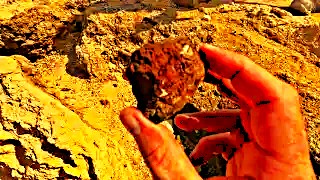
Geoffry Drumm's video above explains how the pyramid's used the natural forces of lightning combined with the plataeus boat pits acted as electrical circuit breakers to affect Chemistry and physics of the iron and other elements on the Giza plataeu. See more on his Youtube Channel : 'The Land of Chem.'
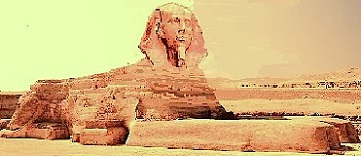
As we know, the pyramids usually contain an open well shaft leading down to an underground system of tunnels and rooms. All forcing their massive weights
down upon some form of well pump housing, dwellings or aquafers below. But what was used to keep the many millions of tons of stone blocks and bedrock
 from cracking apart and caving
in on top of all these open shafts, rooms, aquafer outlets and hollow tunnnels below?
from cracking apart and caving
in on top of all these open shafts, rooms, aquafer outlets and hollow tunnnels below?
 Khufu allegedly had his son Khafre, who had been
killed, made into the head of the Great Sphinx--the Watch-Dog over the hidden secrets below. The legendary wolf-pelt as worn by the ancient Celts, the
Hyperboreans/Hiberians,'archaic Greeks,' who were the original founders and builders of Egypt, showed the original sphinx as 'Anubis' a wolf, the ancient
Celtic shepherd--sheep dog who lays with his forepaws stretched out in front as only dogs lay. Dog faces are also found on the prows of some more 'recent'
ancient Celtic/Danish ships. Later, unknowlegeables chopped 'Khafre's' nose off, like they did to many other sculptures and Pharaonic images for sport
and defiance.
Khufu allegedly had his son Khafre, who had been
killed, made into the head of the Great Sphinx--the Watch-Dog over the hidden secrets below. The legendary wolf-pelt as worn by the ancient Celts, the
Hyperboreans/Hiberians,'archaic Greeks,' who were the original founders and builders of Egypt, showed the original sphinx as 'Anubis' a wolf, the ancient
Celtic shepherd--sheep dog who lays with his forepaws stretched out in front as only dogs lay. Dog faces are also found on the prows of some more 'recent'
ancient Celtic/Danish ships. Later, unknowlegeables chopped 'Khafre's' nose off, like they did to many other sculptures and Pharaonic images for sport
and defiance.
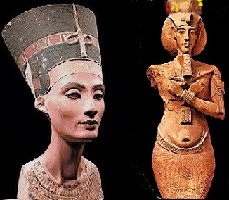
The name 'Akhenaten' means 'Sister of the Sun.' Every image of Akhenaten shows her to be a female--not a male. Her sculpter and artist tried to show her
as a majestic powerful female God-type and distorted her facial features a bit. She has absolutely no male organs nor male features of any kind anywhere--only
female; wherein she glorifies Motherhood--Her very objective.

Egypt was Matriarchal, not Patriarchal until the Nubian, Black Slave army, whom the Egyptians/Phoenicians had personally trained, turned on them. Egypt's
Nubian Army sabotaged the female Pharaoh and took over her government. Her Nubian male consort was the General of the Nubian army, and refused to become
a Eunuch.
Becoming a Eunuch was the reward at the close of the male Consort's yearly 'Shepherd of the Year' Consortship, wherein he was then obligated to become a
bodyguard for the Royal women and their children. Herodotus stated in his "Histories" that it took forty generations for the Phoenicians to reconquer the
Nubians they had trained and retrive Egypt back. Many Egyptian artworks had been destroyed, painted over, and original Egyptian graves looted by the Nubian
slaves and their army Usurpers.

Thus Alexander's armies did not have to lift a single finger to fight a single man, nor fight a single regiment or battle. Alexander then became the Pharaoh
of Egypt; but he and his armies still continued chasing and fighting the Persian King, Darius III and his armies clear into India. He also married a Persian
girl before he was mortally wounded by a spear thrust into his chest, and died at the young age of only 32 years old.


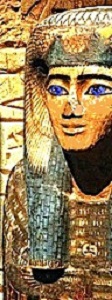
Religion itself was not only created by the nobles to control the people (according to 'Confucius/Chufu'), but to also hide scientific knowledge from any
scoundrels who wanted control of the governments and their resources. It was believed the scoundrels would assume the religious art, writings and scriptures
were all just part of the common people's religious beliefs, and would pay no attention to the secret sciences that were hidden there in plain sight, or in
non-understandable coded or script forms for initiated students only, and would then remain safely 'hidden.'
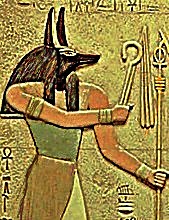
The Children of Israel were the decoy for the secret of smelting copper which was inserted very out of place, and very short, by quickly mentioning that copper
was smelted just like silver. In the Egyptian hieroglyphs 'Nebu' is the God of gold, and likely represented gold itself--not a god. But codes were used to
ward-off scoundrels and thieves too superstitious or ignorant to see the secret or double meanings. 'Al Khem' really was the land where alkhemy (alchemy)
presided; and Gizabos (Gazebos) originated. Even today some history can still be found accidently hidden in words.



In 2nd Kings of the O.T., Torah, Farsis warn their armies of pirates that the Tribes of Dan(es) lived on their ships and were guarding the coast by sea, and the Assyrians (the Dan's brethren Assurs) lived on the coast and guarded it from there. The first known 'Coast Guards' guarding the Mediterrainean coast from the Aryans/Iranian invasions. The very name Assur is related to the copper carbonate ore Azurite, which was another favorite gem-stone. Dans/Danes means Sun/Dawn (Dons).
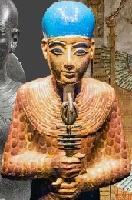
 The Phoenicians/Egyptians/Greeks/Celts (the above) already knew some of the enemy 'scoundrels' were the Iranians and had hidden their ores and mineral mines
under the facade of necropolises and cemetaries where there was always digging and building going on along with burials and accompaning rituals. Our archaic
sciences and histories were hidden tightly within religious spells and so-called Dog ma, with metaphors, double meanings, and coded scripts to preserve
them from malicious, greedy land pirates.
The Phoenicians/Egyptians/Greeks/Celts (the above) already knew some of the enemy 'scoundrels' were the Iranians and had hidden their ores and mineral mines
under the facade of necropolises and cemetaries where there was always digging and building going on along with burials and accompaning rituals. Our archaic
sciences and histories were hidden tightly within religious spells and so-called Dog ma, with metaphors, double meanings, and coded scripts to preserve
them from malicious, greedy land pirates.
Later, because of wars, sabotage, migrations, several invasions by other cultures, who in their ignorance changed the mythologies of the original Egyptian
hieroglyphs whose stories held many esoteric double meanings. Then came time and generations, and becoming lost, the original true meanings were forgotten
and now unknown.
Above left is Ptah, god of sound and speech, of creation; of forming crafts, and making, and creating. He is holding the combined symbols of
the Ankh and Djed, now only known to science as the original forerunner of Tesla's crudly formed 'Tesla Coil'. On right is An old Ptah 'look-a-like'
Bakhtiari-Luri Nomad wearing an odd simile of Ptah's cap in their Sagros Mountain wanderings.
 A fairly modern old poem from the 1600s about the Giant Celts.
A fairly modern old poem from the 1600s about the Giant Celts.

One thing proven to be under and within the Giza Plateau is a very deep underground water table, some of which has possibly been trapped in, and sealed-off
in areas eor thousands of years or more. The Plateau has an underground tidal water-table, aka Osiris itself, that fills and floods the underpinnings
and tunnels running for miles under the plateau which also watered the ancient farmlands of Egypt. And if the Chemists are correct, with very fertile water,
that is, water from Osiris, the bountiful food supplier, through the Alchemy of the pyramid laboritories.
The Giza Plateau is still an island, although now dry, but is inundated and seasonaly flooded well below ground with varying levels of underground water.
Every major pyramid on Earth appears to have been built over artesian wells, and even now are situated in or near water sources. Some have underground water
tunnels--aquaducts that run for miles like subway systems.
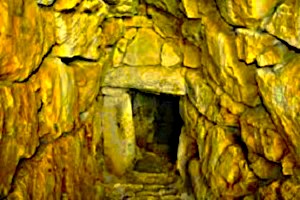
Unfortunately, many of those escaping were unable to complete their very long, arduous walk and their skeletons were found in the tunnels by the archaeologists
exploring them. These underground aquducts which once fed the ancient Mexican farmlands were originally discovered by airplane pilots using ground-penetrating
infra-red cameras.
Welcome Viewers:
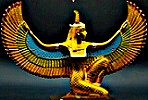
Infinity
'HeH . Hey . Hi'
Ancient Star Network


is a non-profit, non-commercial, informational & educational ePublication.
 Mystery Faces
Mystery Faces 